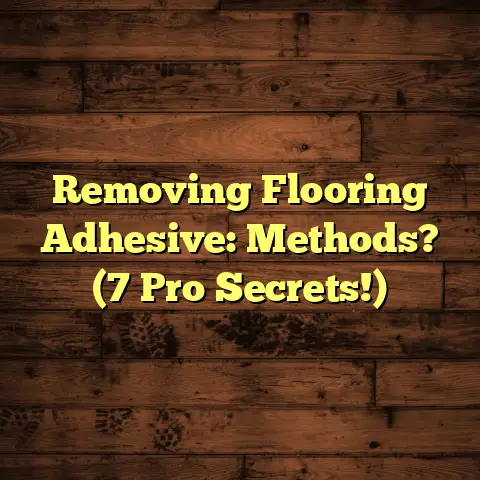Polished Concrete Flooring Cost Uk (Explained)
Polished concrete flooring has become a popular choice for both residential and commercial spaces in the UK. Known for its durability, low maintenance, and modern aesthetic, polished concrete can be a cost-effective flooring solution. This article will provide a comprehensive overview of the costs associated with installing polished concrete flooring, including key factors that affect pricing, comparisons with alternative flooring options, and maintenance tips to enhance longevity.
Overview of Major Cost Factors
When estimating the cost of polished concrete flooring, several key factors come into play:
1. Area Size
The size of the area where the polished concrete will be installed is one of the most significant cost determinants. Larger areas typically benefit from a reduced cost per square meter due to economies of scale.
2. Concrete Type
The type of concrete used can significantly influence the overall cost. Options include standard concrete, coloured concrete, or even decorative options such as stamped concrete.
3. Labour Costs
Labour costs can vary depending on the contractor’s experience, location, and the complexity of the installation. Skilled tradespeople will generally charge more but may provide higher-quality workmanship.
4. Additional Considerations
- Floor Removal: If existing flooring needs to be removed, this will add to the overall cost.
- Subfloor Preparation: Proper preparation of the subfloor is essential for a successful installation. Any repair or reinforcement needed will incur additional costs.
- Material Grade: Higher-grade materials will cost more but may offer better durability and aesthetics.
- Room Layout: Complex room shapes may require additional cutting and labour, increasing costs.
- Installation Type: Different methods (e.g., polished vs. stained) can affect pricing.
Detailed Cost Breakdown
Here’s a detailed cost breakdown for polished concrete flooring in the UK based on different project sizes and types:
Small Projects (Up to 50 sq.m)
- Cost Range: £1,500 to £3,000
- Average Cost per sq.m: £30 to £60
Medium Projects (50 – 100 sq.m)
- Cost Range: £3,000 to £6,000
- Average Cost per sq.m: £25 to £50
Large Projects (100 sq.m and above)
- Cost Range: £6,000+
- Average Cost per sq.m: £20 to £40
Breakdown by Concrete Type
- Standard Polished Concrete: £30 – £60 per sq.m
- Coloured or Decorative Polished Concrete: £50 – £80 per sq.m
- Stained Concrete: £40 – £70 per sq.m
Comparison with Alternative Flooring Options
When considering polished concrete, it’s essential to compare it with other popular flooring options:
| Flooring Type | Average Cost per sq.m | Durability | Maintenance |
|---|---|---|---|
| Polished Concrete | £20 – £80 | Very High | Low |
| Laminate | £10 – £30 | Moderate | Moderate |
| Vinyl | £15 – £40 | Moderate | Low |
| Carpet | £10 – £50 | Low | High |
Signs Your Flooring Needs Replacement
Recognising when your polished concrete flooring needs replacement is crucial for maintaining a safe and aesthetic environment. Signs include:
- Cracks and Chips: Significant damage that affects structural integrity.
- Discolouration: Persistent stains or fading caused by wear and tear.
- Uneven Surfaces: Changes in texture that could indicate underlying issues.
Refinishing vs. Replacement
If your flooring displays minor damage, refinishing might be a viable option. However, if there are extensive cracks or structural concerns, replacement is likely necessary.
Pros and Cons of Polished Concrete Flooring
Pros
- Durability: Highly resistant to wear and tear.
- Aesthetics: Offers a modern and sleek look that can be customised.
- Low Maintenance: Requires minimal upkeep compared to other flooring types.
Cons
- Cold Feel: Can be uncomfortable in cold climates without underfloor heating.
- Hard Surface: Less forgiving on joints compared to softer flooring materials.
- Slipperiness: Can become slippery when wet; consider adding anti-slip additives.
Professional Installation vs. DIY
Cost Differences
- Professional Installation: Generally ranges from £20 to £80 per sq.m, including materials and labour.
- DIY Installation: Materials alone can cost between £10 to £30 per sq.m, but additional tools and skills are needed.
Tools and Skills Required
DIY installation requires specific tools such as trowels, polishers, and grinders. It also demands knowledge of mixing ratios and curing processes, making professional installation a safer choice for many.
Questions to Ask Hardwood Flooring Contractors
When hiring a contractor for polished concrete installation, consider asking the following questions:
- What experience do you have with polished concrete installations?
- Can you provide references from past clients?
- What warranties do you offer on your work?
- How do you handle unexpected issues during installation?
- What preparation work will be done prior to installation?
- Can you explain the process step-by-step?
Care and Maintenance Tips for Polished Concrete
To maximise the longevity of your polished concrete floors, follow these maintenance tips:
- Regular Cleaning: Sweep or vacuum regularly to remove dust and debris.
- Mopping: Use a damp mop with a pH-neutral cleaner periodically.
- Sealants: Apply sealants as recommended by your contractor to protect against staining.
- Avoid Harsh Chemicals: Steer clear of abrasive cleaners that can dull the surface.
- Address Stains Promptly: Clean spills immediately to prevent staining.
Conclusion
Polished concrete flooring presents an attractive option for many homeowners and businesses in the UK. With careful consideration of costs and factors influencing pricing, along with understanding maintenance requirements, individuals can make informed decisions regarding their flooring projects. Whether opting for professional installation or tackling a DIY project, being equipped with knowledge about polished concrete can lead to a successful outcome that enhances both aesthetics and functionality in any space.





